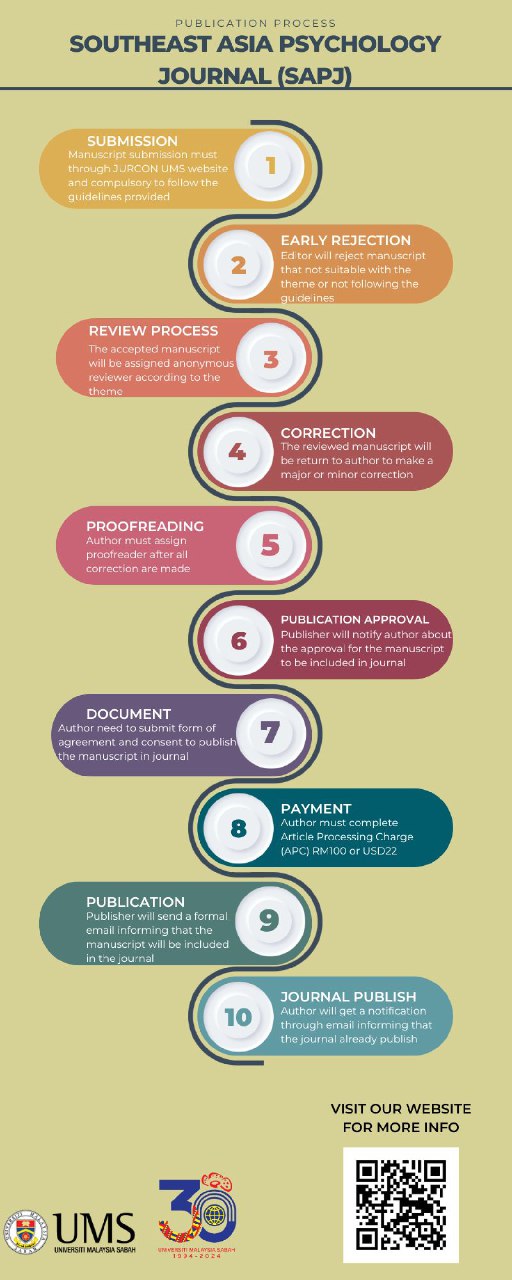PREDICTORS OF THE ENJOYMENT AND MISSING EXPERIENCES OF MALAYSIAN STUDENTS IN HOME COUNTRY AND OVERSEAS
DOI:
https://doi.org/10.51200/sapj.v7i1.5169Keywords:
Adaptation Experience, Overseas Students & Home Country StudentsAbstract
The purpose of this longitudinal study was to identify the predictors of the adaptation experiences of Malaysian students in home country and overseas, from two perspectives: missing and enjoyment experiences. At Time 1, 2090 responses were collected from a group of students who were enrolling at various overseas preparatory studying programmes (later termed as overseas students) and also first year students who were continuing their education at a public university in Malaysia (later termed as home country students). At Time 2, 628 of the participants were retained. The predictor variables were Time 1 well-being indicators (i.e. life satisfaction, positive and negative affect), importance and satisfaction of conservation and self-transcendence values, perceived success (measured by the Malaysian Certificate of Examination results and perceived English language fluency), personality, and parents’ level of education. The findings showed that overseas students who had a low level of English language fluency and a high level of importance of conservation and satisfaction of self-transcendence values tended to miss home. Similarly, overseas students who were less fluent in English were less likely to enjoy their life abroad. Whilst for the home country students, the high level of negative affect predicted their missing experience, and none of the predictor variables were found to be significant in contributing to enjoyment experience.
References
Cheng, H., &Furnham, A. (2002). Personality, peer relations, and self-confidence as predictors of happiness and loneliness. Journal of Adolescence, 25, 327-339.
Compton, W.C. (2005). An introduction to Positive Psychology. Belmont, CA: Thomson Wadsworth.
Diener, E., Emmons R., Larsen, R. & Griffin, S. (1985). The Satisfaction
with Life Scale. Journal of Personality Assessment, 49(1): 71-75.
Fritz, M.V., Chin, D., &DeMarinis, V. (2008). Stressors, anxiety, acculturation and adjustment among international and North American students.International Journal of Intercultural Relations, 32, 244–259.
Hechanova-Alampay, R., Beehr, T.A., Christiansen, N.D., & Van Horn, R.K. (2002). Adjustment and strain among domestic and international students sojourners: A longitudinal study. School of Psychology International, 23(4), 458-474.
Jose, P., Ward, C., & Liu, J.H. (2007). Cross-cultural adaptation of Asians and Western International Students in New Zealand.InJ.H.Liu, C.Ward, A.B.I.Bernado, M. Karasawa, &R.Fischer. (Eds.). Casting the individual in societal and cultural contexts: Social and societal psychology for Asia and the Pacific. Progress in Asian Social Psychology Series Vol.6, Seoul, Korea: Kyoyook-Kwahak-Sa Publishing Company, pp 205-224.
John, O. P., Donahue, E. M., & Kentle, R. L. (1991). The Big Five Inventory - Versions 4a and 54. Berkeley, CA: University of California, Berkeley, Institute of Personality and Social Research.
Joshanloo, M. (2010). Investigation of the relation between cultural estrangement and hedonic and eudaimonic aspects of well-being in Iranian young adults.Personality and Individual Differences, 49, 733-737.
Lindemann,M. & Verkasalo, M. (2005). Measuring values with the Short Schwartz’s Value Survey. Journal of Personality Assessment, 85, 170-178.
Mohd.Yusoff, Y., &Chelliah, S. (2010). Adjustment in international students in Malaysian Public University.International Journal of Innovation, Management and Technology, 1(3), 275-278.
Schwartz, S.H. (1992). Universals in the content and structure of values: Theoretical advances and empirical tests in 20 countries. Advances in Experimental Social Psychology, 25, 1-65.








